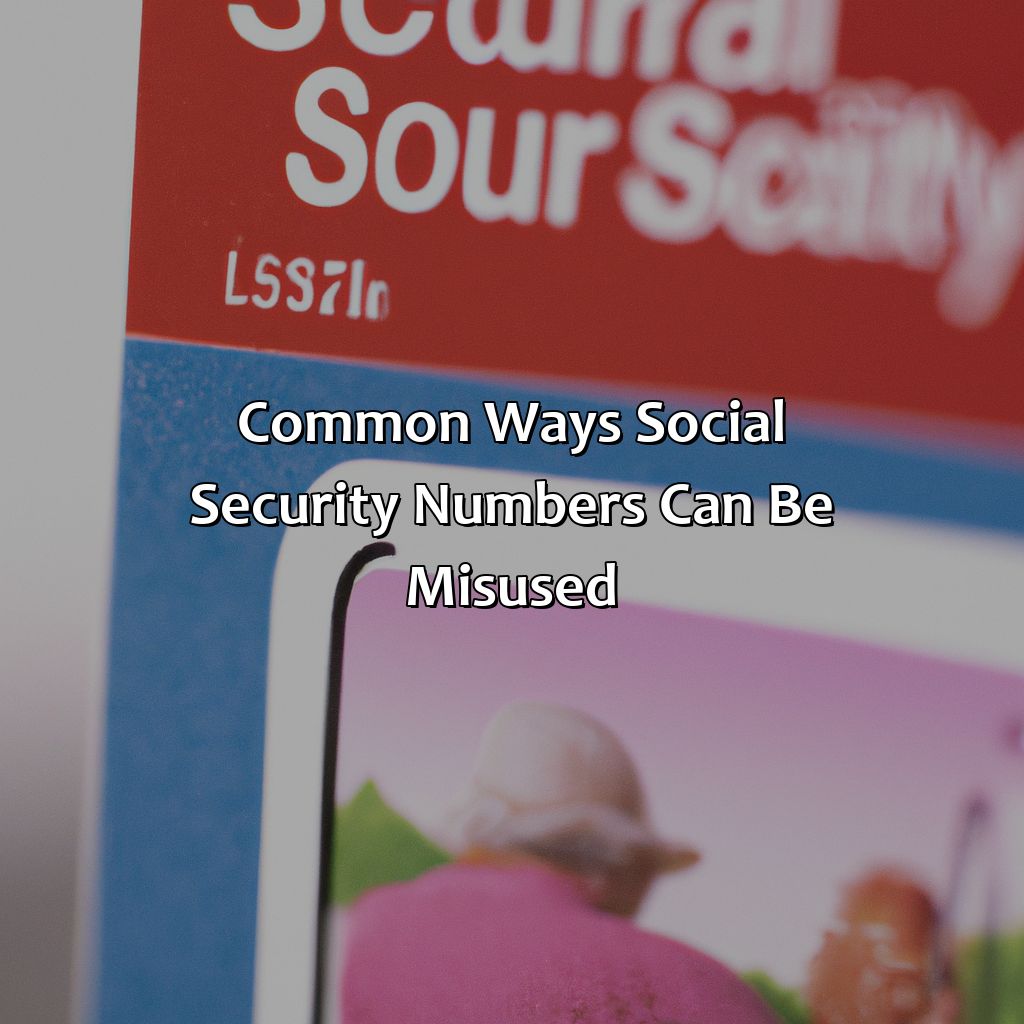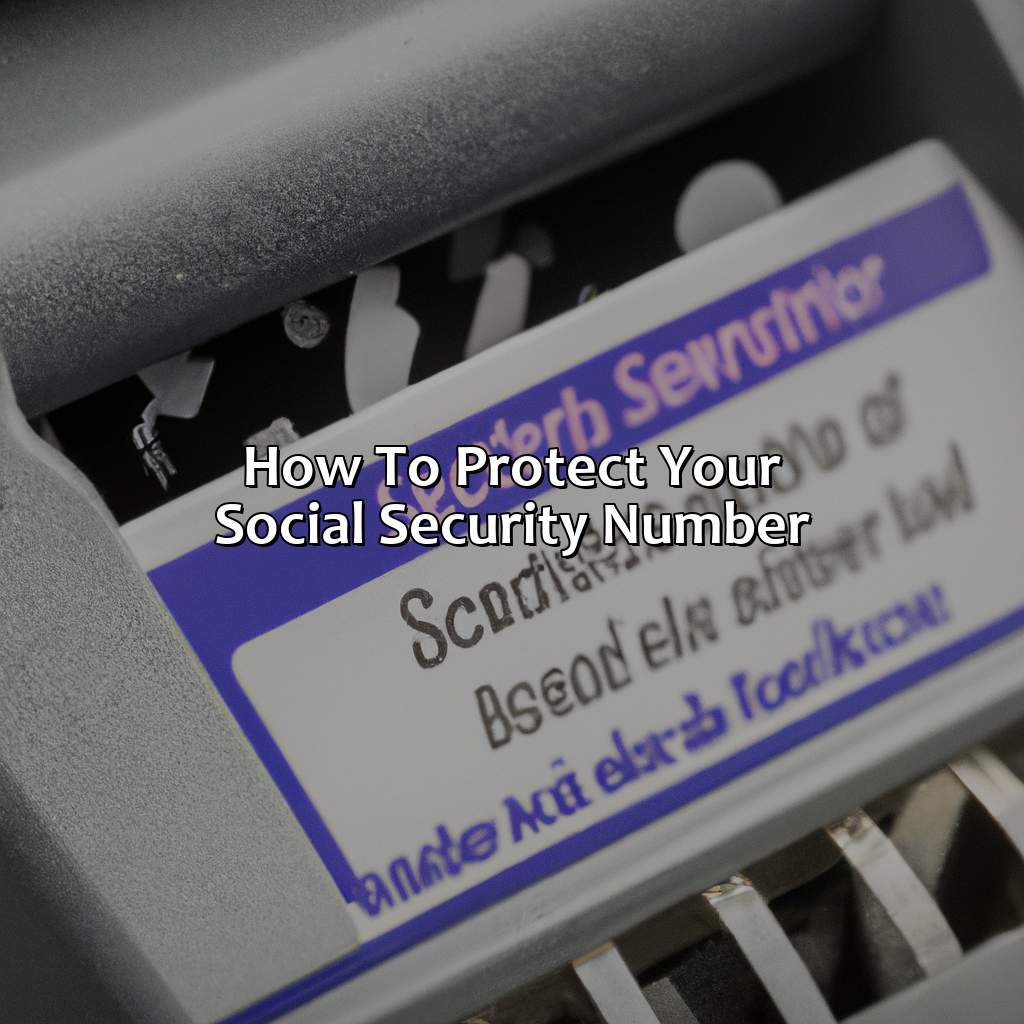What Can Someone Do With Your Social Security?
Key Takeaways:
- Social Security numbers can be misused for identity theft, employment fraud, government benefits fraud, and financial fraud. It is important to be aware of these risks and take necessary steps to protect your personal information.
- To protect your Social Security number, do not carry your Social Security card, be cautious when giving out your Social Security number, monitor your credit report and Social Security statements, and protect your personal information by using secure passwords, avoiding phishing scams, and shredding sensitive documents.
- If you suspect that your Social Security number has been compromised, take immediate action by reporting it to the relevant authorities and monitoring your credit reports and financial accounts for any suspicious activity.
Are you concerned about your personal information being used by someone else? This article will explain what someone can do with your social security number and how you can protect yourself. You will learn the various risks you face and the steps you can take to defend your identity.
What is Social Security?
Social Security refers to a federal insurance program administered by the Social Security Administration. It provides benefits to retired, disabled, and dependents of deceased workers. It is funded through payroll taxes paid by employees and employers. The benefits received are based on an individual’s earnings throughout their working life.
With access to someone’s Social Security number, an individual can potentially commit identity theft and fraud. They may be able to open credit accounts, file for tax refunds, or even receive Social Security benefits in the victim’s name. It is crucial to keep your Social Security number safe and be cautious of who you share it with.
It is important to note that Social Security numbers are not reissued, making them a valuable target for identity thieves. It is recommended to regularly review your Social Security earnings statement and credit reports to ensure accuracy and detect any unauthorized activity.
According to the Federal Trade Commission, 3.2 million identity theft and fraud reports were filed in 2019.

Image credits: retiregenz.com by Yuval Duncun
Common ways Social Security numbers can be misused:
Protect your Social Security number! Understand how it can be misused. Common ways include: Identity Theft, Employment Fraud, Government Benefits Fraud, and Financial Fraud. Learn all about it here!

Image credits: retiregenz.com by Harry Duncun
Identity Theft
The malicious practice of pilfering one’s unique identification number and impersonating them is known as ‘Identity Theft.’ It is prevalent in today’s digital world, with cybercriminals bypassing security systems to acquire personal information. Using this trickery, they can purchase goods or services online, open credit lines, access bank accounts and commit other malicious activities under the victim’s name. This can lead to dire consequences such as destabilization of finances, damage to credit history and emotional stress.
In addition to defrauding financially, hackers can misuse a person’s SSN by pursuing insurance payouts, acquiring fraudulent loans or committing more such offenses. They also target medical records for illegal purposes, which may lead to unauthorized utilization of health benefits or circulate sensitive data on illicit channels.
It is crucial that victims report these incidents and take necessary steps such as regularly analyzing their credit reports and monitoring their accounts for any suspicious activity. They must attempt to safeguard their identities continuously by being mindful of whom they disclose personal details to online and offline.
A recent case study revealed a fraudulent operation run by con-artists in the US who’d steal people’s social security numbers using hacked personnel databases. They sold this information on the dark web for $2 apiece before racking up high-value charges on unsuspecting citizens’ credit cards; many were still unaware months after it happened!
Employment fraud is like a bad date, you think you’re getting hired for a job, but really you’re just being used for your Social Security Number.
Employment fraud
Using someone else’s social security number to obtain employment is a type of identity theft commonly known as ‘Wage Theft’. Such fraud can be executed by using fake identification documents, information that belongs to another individual, or any other falsified data. To detect this type of fraud, the Internal Revenue Service (IRS) has introduced an e-verify program that enables employers to confirm the authenticity of Social Security numbers before and during the hiring process.
Employers who violate federal regulations by employing undocumented workers will be subject to fines ranging from $250 to $2,000 per violation. However, those fines could be significantly higher if it is found that an employer knowingly hired undocumented individuals.
It is not only illegal but also a strong threat to our economy by depressing wages and limiting opportunities for lawful workers.
To avoid wrong use, everyone must keep their social security numbers confidential and authenticate them regularly.
Government benefits fraud: where scammers get paid to be lazy, while hardworking taxpayers foot the bill.
Government benefits fraud
Fraudulent activities that center around government benefits are becoming increasingly common these days. Scammers can use your personal information, such as your Social Security number, to apply for various government benefits in your name. This could include unemployment benefits, Social Security Disability Insurance (SSDI), and Supplemental Security Income (SSI). Once scammers receive the funds from these benefits, they quickly withdraw all the money or transfer it to another account, leaving you empty-handed.
Such fraudulence can result in devastating financial losses for people who genuinely need assistance. It not only causes undue stress and anxiety but could also lead to legal implications if left unnoticed.
It’s essential to remain vigilant when it comes to safeguarding your sensitive data because identity theft is a prevalent problem worldwide. If you suspect any fraudulent activity on your accounts or have lost a crucial document containing confidential information like your Social Security card, you must report it immediately.
According to a recent survey by AARP’s Fraud Watch Network, 18% of Americans reported experiencing some form of benefit-related fraud since the start of the COVID-19 pandemic.
“Don’t worry about getting scammed, your Social Security number is priceless – to everyone except identity thieves.”
Financial fraud
The misappropriation of a Social Security Number (SSN) can result in various types of financial fraud, which can wreak havoc on someone’s credit history and financial standing. Cybercriminals can use SSNs to open bank accounts, obtain loans or credit cards, file false tax returns, and even apply for government benefits. The consequences of such fraudulent activities are usually severe, leading to immense mental and financial stress for victims.
In addition to identity theft, an SSN can also be used for medical identity theft. Scammers can use an individual’s SSN to obtain fraudulent medical services or products, and the victim may receive bills for treatments they never received. This type of fraud can lead to incorrect medical records or denial of health insurance coverage.
It is imperative to keep an eye out for any unauthorized activity on one’s bank statements, credit reports, and medical bills. Victims must report any suspicious activities immediately to credit bureaus and relevant financial institutions.
A shocking report by Javelin Strategy & Research found that 16.7 million consumers fell victim to identity theft in 2017 alone.
Don’t be a social butterfly – protect your Social Security number like it’s your ex’s phone number.
How to protect your Social Security number:
Protect your SSN from fraud! Follow these simple tips:
- Don’t carry your card.
- Shield your personal info.
- Monitor your credit report & SS statements.
- Be careful when giving out your SSN.
Let’s explore each of these in detail.

Image credits: retiregenz.com by James Washington
Do not carry your Social Security card
Your Social Security card is a valuable and sensitive document that should not be carried around on a regular basis. This recommendation is based on the need to protect your SSN, which can cause you grave harm if in the wrong hands. Anyone possessing your social security number can gain access to your credit history, medical information, and bank accounts. Therefore, it is important to keep your SSN safe by avoiding carrying it with you everywhere you go.
Thieves can steal or replicate your Social Security card and use it fraudulently. Hence, keeping the card hidden at home or locked away in a safety deposit box is crucially important. Instead of carrying this sensitive document on your person all the time and risk losing it, make multiple copies of the original and keep them separately in secure locations.
Besides, you should always shred any official documents that contain your social security number to prevent identity theft. Any mail from financial institutions or government agencies should be opened by you alone since they usually include sensitive personal information like an SSN.
In recent years, some elderly people have been taken advantage of by criminals who pretend to help with financial matters only to steal their Social Security numbers later on. Never reveal it unless trustworthy organizations request for legitimate reasons like signing up for taxes or insurance among others.
Lastly, remember that securing your Social Security Card plays an essential role in keeping you safe from online scams as well as physical risks such as theft and forgery – always stay vigilant! Keeping your personal information safe is like wearing underwear – it should always be on and never shown to strangers.
Protect your personal information
Your personal information is valuable, and protecting it should be a top priority. Any disclosure of this information can lead to severe consequences that might change your life forever. Identity theft is becoming more common these days so it’s crucial to know how to protect your identity online and offline.
There are several ways in which you can protect your personal information and keep yourself safe. One way to safeguard your data is by making sure you don’t share too much information on social media platforms. Cybercriminals often use social media profiles as their primary source because most people share a lot of sensitive details on them. You need to be careful when giving out your contact and financial details or anything that may identify you like your date of birth or Social Security number.
Another technique is to enable two-factor authentication wherever possible, especially for accounts containing sensitive information such as banking portals, email, smartphones, laptops, and social networks. It can help add an extra layer of security, reducing the chances of hackers accessing your accounts even if they have stolen your credentials.
In some countries like the United States where we have Social Security numbers assigned at birth; cybercriminals can easily steal these numbers using various tactics like phishing scams or malware attacks. The largest recorded data fraud ever was committed with the help of stolen social security numbers belonging to employees from one credit union in the US in 2017. Unfortunately, once someone gains access to it; the impostors could potentially take loans out in another person’s name and rack up huge debts that will fall back on you until cleared.
Better check your statements regularly, or else your credit score will take a hit harder than your ex’s new relationship.
Monitor your credit report and Social Security statements
By keeping tabs on your credit report, you can ensure that no one is using your personal information to obtain unauthorized credit or loans. Additionally, monitoring Social Security statements for any unusual activity will help protect against identity theft and fraudulent claims. It is imperative to stay vigilant and report any suspicious behavior immediately.
Sharing your Social Security number is like sharing your toothbrush – only do it with people you really trust.
Be cautious when giving out your Social Security number
Your Social Security number is critical and must be given out only when necessary. Providing your SSN to an organization that does not require it may lead to identity theft and credit fraud. To safeguard your identity, verify if the requestor needs your SSN, how they will secure and use it before sharing.
Moreover, avoid carrying your Social Security Card in your wallet or purse. Instead, store it in a safe place at home. Similarly, don’t share it over the phone with unverified callers or emails, even if requested by trusted companies like banks. When accessing your credit reports or logging into a website that asks for an SSN, ensure the connection is encrypted.
Lastly, take steps to monitor unauthorized activities on your social security number, such as registered accounts you didn’t create or transactions you didn’t authorize. Use credit monitoring services and reporting agencies to check for suspicious activities regularly.
By taking precautionary steps and being vigilant about who receives your Social Security number information can go a long way toward keeping you safe from potential cybercrime hitches that could negatively affect you financially and emotionally. Be proactive before the need arises.
Five Facts About What Can Someone Do With Your Social Security:
Someone with your Social Security number can open credit accounts and apply for loans in your name. (Source: Federal Trade Commission)
Thieves can use your SSN to file false tax returns and claim refunds. (Source: Internal Revenue Service)
Fraudsters can use your SSN to access your medical records and insurance benefits. (Source: Centers for Medicare and Medicaid Services)
Criminals can use your SSN to commit identity theft and other financial crimes. (Source: Social Security Administration)
Your SSN is a valuable commodity on the dark web and can be sold to other criminals for profit. (Source: NortonLifeLock)
FAQs about What Can Someone Do With Your Social Security?
What can someone do with your social security?
Someone with your social security number can access your personal information, open credit accounts in your name, and commit identity theft.
Can someone open a bank account with your social security number?
It is possible for someone to use your social security number to open a bank account in your name, but it is illegal to do so without your consent.
Can someone file taxes with your social security number?
Yes, someone can file taxes using your social security number, which can lead to fraudulent tax refunds being issued to them instead of to you.
Can someone apply for government benefits with your social security number?
Yes, someone can apply for government benefits using your social security number, such as unemployment benefits or disability benefits, which can impact your ability to access those benefits in the future.
What should you do if someone has your social security number?
If someone has your social security number, you should monitor your credit reports, report any suspicious activity to credit bureaus and financial institutions, and consider placing a fraud alert or freeze on your credit report.
Can someone find out your social security number with just your name and date of birth?
No, it is difficult for someone to find out your social security number with just your name and date of birth, but it is not impossible.
 Checkout this IRS Loophole
Checkout this IRS Loophole 
